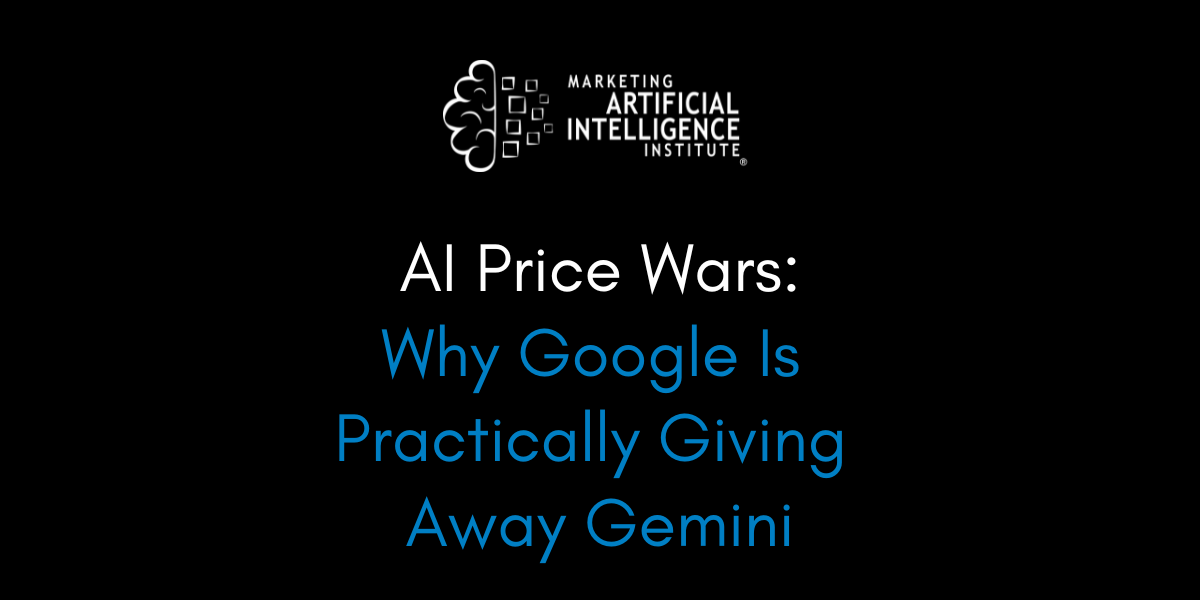Google and Microsoft just changed the game on AI pricing—and the differences in their approaches couldn’t be more stark.
Google is effectively giving away its Gemini AI to Workspace business customers (with a small price bump), while Microsoft is rolling out consumption-based pricing for certain AI features.
Which strategy will win?
I dug into the details with Marketing AI Institute founder and CEO Paul Roetzer on Episode 131 of The Artificial Intelligence Show.
Google’s Move: Give Gemini to Everyone
Google has announced that Gemini—its next-level AI model—is now included by default in Google Workspace business plans. That means if you’re paying for Workspace, you’ll automatically get Gemini.
The catch? Google has slightly increased monthly subscription prices.
- Old Price: $12/user/month (Business Standard plan without Gemini)
- New Price: $14/user/month (Business Standard plan with Gemini)
Of course, this is all drastically cheaper than the original $32 per user per month for the “Business Standard + Gemini” add-on. Instead of letting users opt in at a higher price, Google’s just rolling Gemini into the base plan and charging everyone a couple extra bucks.
Why Google’s Doing It
Roetzer sees two big reasons:
- Undercut competitors who don't have Google's data centers, chips, distribution, and war chest.
- Maximize revenue by hiking everyone's subscription by a small amount for a massive perceived increase in value rather than rely on a fraction of Workspace users paying a lot more for Gemini.
Microsoft’s Move: Consumption-Based Pricing
Microsoft, meanwhile, is keeping its CoPilot Pro license at $30 per user per month. But it’s introducing a consumption-based pricing model for certain AI agent features, which the company says “automate workplace processes.”
According to The Information, the pricing model works like this:
“Under the new consumption pricing, one message within 365 Copilot Chat costs roughly one cent, while messages that require the chatbot to create a lengthy answer using generative AI cost two cents, and messages that require the chatbot to draw on other data from other applications cost 30 cents.”
What Could Go Wrong?
“My first thought is if I have to reread your pricing four times to comprehend what it is, it's probably not going to work,” says Roetzer.
Usage-based pricing can also be a tough sell for businesses leaders, says Roetzer. It's difficult to predict usage accurately in advance, and consumption-based pricing leads to surprise bills.
"I just can't see in an enterprise allowing the variability of pricing when the CFO doesn't even understand how the product is going to be used," says Roetzer.
There’s a real risk that users could rack up unanticipated costs, while CFOs scramble to set usage caps. That could turn off many leaders with budget and purchasing authority.
The Bigger Picture: Confusion Everywhere
Whether you’re talking about Google, Microsoft, or OpenAI itself, the rapid rollout of AI features has created a chaotic user experience:
A recent thread from AI power user Timo Springer captured the frustration many experience across platforms trying to sort out different features, capabilities, and pricing—sometimes within the same product:
ChatGPT is a confusing mess right now. It seems like a few months ago they embraced a new product strategy (which is good), but there's still lots of legacy features like GPTs that feel really out of place with newer releases like projects and tasks.
— Timo Springer (@springertimo) January 17, 2025
What bothers me the most is…
The bottom line? The entire industry is still figuring out how to integrate AI features, set pricing, and make the user experience seamless. Expect a lot more iteration from both Google and Microsoft—especially as they race to capture enterprise market share.
Mike Kaput
As Chief Content Officer, Mike Kaput uses content marketing, marketing strategy, and marketing technology to grow and scale traffic, leads, and revenue for Marketing AI Institute. Mike is the co-author of Marketing Artificial Intelligence: AI, Marketing and the Future of Business (Matt Holt Books, 2022). See Mike's full bio.


